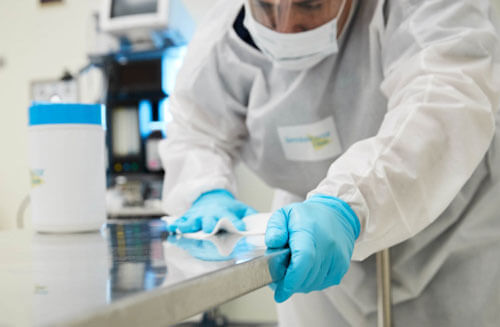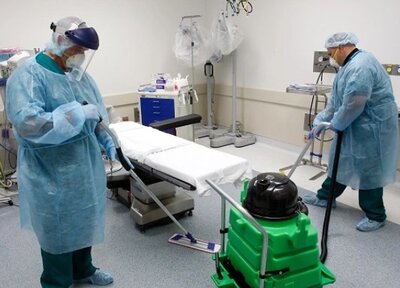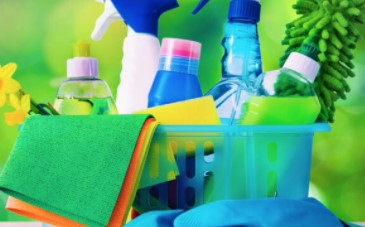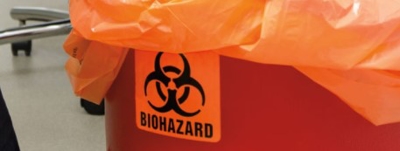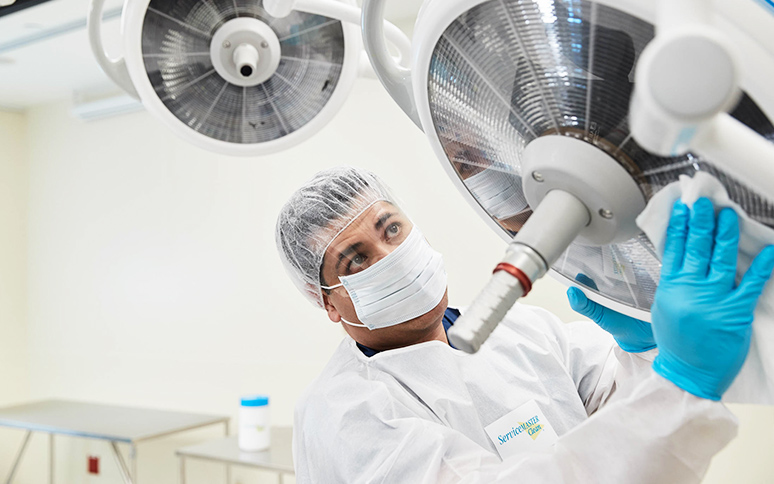Disinfectant Wipes in Healthcare Settings
Working within a healthcare facility has its challenges. As a healthcare professional, you know that one of your major duties is cleaning dirty rooms and disinfecting surfaces. Since all surfaces carry the risk of harboring dangerous microorganisms, it's crucial to supply your staff members with high-quality disinfectant wipes.
With their ability to help prevent infection and keep diseases from spreading across patients or between rooms, disinfectant wipes are a great tool for decreasing cross contamination clean until the environmental services staff can fully disinfect the building. Learn more about the many benefits of using hospital disinfecting wipes with information from the experts at ServiceMaster Clean.
The Benefits of Hospital Disinfectant Wipes
While these wipes shouldn't be a total replacement of a full professional cleaning, they're great for quickly picking up minor messes or spills around the facility, disinfecting nurse's working stations and medical equipment after each use. Disposable wipes are ideal for easy use on high-touch surfaces in dental offices, chiropractic practices, waiting rooms and general patient areas.
According to the Centers for Disease Control and Prevention (CDC), hospital disinfecting wipes must be used for the appropriate contact time to ensure that they successfully kill specific germs and bacteria. Check the label on your wipes to determine the appropriate amount of time the surface must stay wet to kill germs. With the appropriate contact time, these wipes are effective for:
Single surface cleaning. Since they are only meant to be used once, disinfectant wipes can reduce the risk of cross contamination or over-use of dirty rags. They also provide cleaning with fast kill times, ensuring areas are disinfected quickly.
Use around patients with respiratory issues. Disinfectant wipes don't produce aerosol like their spray cleaner counterparts. Since the wipes don't emit a mist or dust, they're beneficial for cleaning surfaces around those with respiratory issues.
Quick cleanups in the OR. Disinfectant wipes, when used properly, help reduce cross-contamination in a sterile atmosphere, like an operating room. Operating rooms require full disinfection after each use, but disinfectant wipes offer a convenient solution for quick clean-ups as needed.
Wiping down medical equipment after each use. Items like blood pressure cuffs and other high-touch equipment should be wiped down after each use to reduce cross contamination.
Disinfecting common areas. Nurse's stations, computer stations, sign-in areas, patient rooms and other high-touch areas of the facility require regular cleaning and disinfection throughout the day to reduce the risk of cross contamination or the spread of infections. Using disinfectant wipes to limit pathogens in high-traffic areas will keep your healthcare environment clean and help reduce health risks between professional cleaning services.
When Hospital Disinfectant Wipes Aren't Enough
While cleaning wipes are great for a number of uses and help prevent infection in your facility, you shouldn't rely on them to sanitize or disinfect the entire building. Get to know the difference between cleaning, sanitizing and disinfecting so you can choose the proper treatment for each area within your facility. In critical areas with high risk of transmitting infection, quaternary or sporicidal disinfectants are more effective and should be used over hospital-grade wipes.
Areas requiring high-level sporicidal disinfectants include but are not limited to:
Isolation rooms. Patients admitted to isolation rooms likely have a highly contagious condition requiring separation from the rest of the facility. So, when the patients are discharged, these rooms need complete high-level disinfection to eradicate harmful pathogens and keep them from spreading to staff and patients.
Surgical centers and ORs. Patients of surgical procedures and operations are especially susceptible to infection. In between every operation, all equipment and every surface that has been touched within the room must be fully disinfected to help reduce the risk of healthcare-associated infections (HAIs).
Anywhere bodily fluids make contact with equipment. Blood, waste, vomit and any other bodily fluids carry bacteria that can cause infection if not properly disinfected cleaned. In addition to wiping up the fluid, you'll need to thoroughly disinfect any surfaces or equipment that have come into contact with harmful pathogens that you can't see with the naked eye.
Hospital disinfectant wipes help keep infections under control and reduce the risk of cross contamination throughout the day. However, the best way to ensure your healthcare facility's cleaning program meets industry standards and protects your staff and patients is to partner with experienced professionals.
If you'd like to partner with an environmental service team with years of industry experience, contact the experts in environmental services for healthcare environments at ServiceMaster Clean. Our patient-centered program focuses on specific cleaning needs for healthcare facilities, like infection control and prevention, patient environment improvement, risk reduction and more. Ask us how we can help your healthcare facility meet industry standards today.

